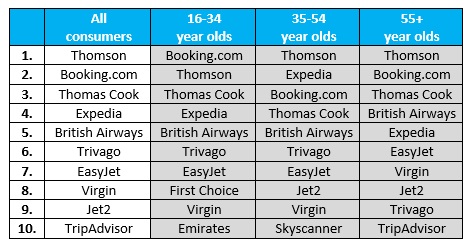
The latest Customer Engagement: Travel report from the DMA, shows that when asked to name their favourite travel brand, Thomson was most mentioned, followed by Booking.com and Thomas Cook.
However, consumers also mentioned over 70 different brands, highlighting the wide range of brands engaging UK consumers.
According to the research, conducted by the DMA and Foresight Factory, with partners Emarsys, Epsilon, Feefo and Wiraya, what consumers want more from travel brands is value for money (59%), convenience (58%) and good customer service (58%).
The top reasons consumers remained loyal to brands in the sector repeat similar themes of good service experience (53%) and good deals (40%), with the addition of a good loyalty or a rewards scheme (40%) to the top three.
Scott Logie, Chair of the DMA Customer Engagement Committee and MD at REaD Group Insight, said: “It’s particularly interesting to see the range of options favoured by customers. When people were asked to name their favourite companies to use for travel, the sheer volume of travel brands mentioned was somewhat surprising. From household names to local travel agents, as well as the new online intermediaries. As individuals we want choice, but we also want to ensure our holidays are hassle free, so we go with companies we trust – even if that is the small local travel agent.”

Steve Ledgerwood, Managing Director UK at Emarsys, said: “Travel really is a hard sector to gain loyalty in, especially with so many brands in the space – each with a unique voice as to why the consumer should choose them. So stand out, be different, show your customer you understand them and cleverly upsell while helping them benefit from a targeted end-to-end experience.”
Trust in travel brands
Rachel Aldighieri, MD at the DMA, said: “Holiday travel is both an exciting and stressful experience, with the chance for distrust and caution to arise in the customer’s mind. Brands that can empathise with customers’ needs at whatever stage of their holiday journey and create communications that reflect their needs will have the potential to build stronger relationships in the long run.”
Within the travel sector hotel and accommodation brands are most trusted (65%) followed by airlines (55%) and online travel booking/price comparison sites (54%). However, this compares to 73% of consumers saying they trust supermarkets to do business fairly. This was further highlighted, with 37% saying it’s important they feel airlines are “not lying to them”, but only half that proportion (18%) say airlines actually deliver on this.
Stephanie D’Sa, Head of Strategy & Insights at Epsilon, said: “Authentic brand communications and values will strengthen trust in the sector, with honesty always being the best policy to make customers more willing to consistently engage. A customer-centric approach won’t restrict your vision in achieving loyalty nirvana.”
Matt West, CMO at Feefo, said: “Trust is so critical to the travel business that successful companies such as Booking.com realise they must offer a platform that verifies reviews and presents them in a readily accessible but unvarnished format. It is no longer acceptable to plaster your website with phoney reviews praising your business. As the industry evolves further, authenticated reviews are going to be the touchstone for trust and transparency in the minds of increasing numbers of potential customers who can smell a rat when it comes to reviews that are fake or filtered.”
New engagement opportunities
Over half of consumers (52%) are willing to use a chatbot to help with pre-travel or booking questions, such as asking an airline for flight details. Once in the airport, 51% of consumers would also be open to sharing their data in order to receive mobile alerts about boarding directions and timings when in an airport.
Augmented and virtual reality presents a new potential channel for travel brands to engage customers too, with more than half (53%) interested in using a virtual reality headset to see a hotel room they are considering staying in. In addition, 44% would like to use augmented reality to get information about the sites or attractions they visit.
Sam Madden, Commercial Director at Wiraya, said: “If you take anything from this report it should be the clear opportunity brands now have to take significant market share if they realise the issues at hand, and understand the need to focus on service and engagement rather than price. For these businesses it’s time to take advantage of the latest technology to stay one step ahead of the competition.”
To read more about the DMA’s Customer Engagement research into the Travel sector, including the full report, visit: https://dma.org.uk/customer-engagement
